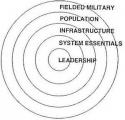
Originally Posted by
Rank amateur

You were there, so I'll defer to your experience, but I'd call that a war: a big messy complicate one with all types of combat.
I say if you're using kinetic weapons "breaking stuff," then it can't be a "stability operation" because by definition when you break stuff it becomes more unstable: albeit the instability is often temporary.
So I still think that the time between when you stop breaking stuff and stability is a good definition and your objective is to get to stability as fast as possible. Intuitively, that definition explains why during stability ops you often need to spend time rebuilding what you broke.
Building some stuff, while breaking other stuff happens all the time, but I'd call the building "getting a head start on stability operations" not stability operations per say. (If the shooting in the AO around the school you built never stops is that because your COIN efforts failed or your stability ops failed? To me, it sounds more like the former.)









 .)
.) 






Bookmarks